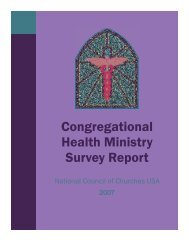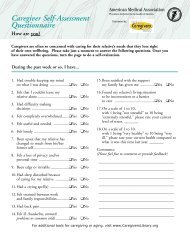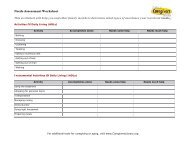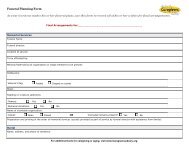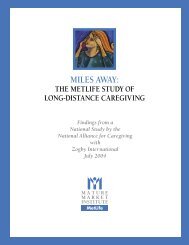nutrition module 1.pub - National Caregivers Library
nutrition module 1.pub - National Caregivers Library
nutrition module 1.pub - National Caregivers Library
Create successful ePaper yourself
Turn your PDF publications into a flip-book with our unique Google optimized e-Paper software.
5Ministry ModuleNutritionNUTRITION ASSESSMENTBasic InformationName:Phone:Address:Directions to home:Emergency Contact Person:Relationship:Current ServicesHome Delivered Meals Yes NoCongregate Yes NoMeals/SeniorCenter Yes NoMealPreparation Yes NoFoodstamps Yes NoIf yes what agency or group?____________________Nutrition InformationHeightWeightRecent Weight Gain/Loss? Yes NoDescribe:Caregiving Ministries ◊ 901 Moorefield Park Drive, Suite 100 ◊ Richmond, VA 23236 ◊ 804-327-1111 ◊ www.CaregivingMinistries.org5
8Ministry ModuleNutritionMINERALS AND VITAMINSMineral and vitamin allowances do not vary greatly from the RDAs for other adults. Food consumption studies indicate manyolder persons are lacking in vitamins and minerals, especially iron, calcium, and vitamin C. In cases where anemia orosteoporosis is present, increased intake of iron, calcium, Vitamin B12, or Vitamin D may be indicated.FLUIDSIt is important to encourage adequate consumption of fluids throughout the day. The RDAs recommend I cc/kcal of energyexpenditure, which equals approximately six to eight glasses per day. These fluids should be encouraged early in the day toavoid discomfort from nocturia. Adequate fluid intake is important for the elderly since they may experience a decrease intheir thirst sensation. Maintaining an appropriate fluid intake will also function to promote good elimination habits.BULK OR DIETARY FIBERSufficient dietary fiber and fluid is helpful to maintain gastric motility or prevent slowing of the activity of the bowels. This mayalready be functioning inefficiently due to advance age and decreased activity. Certain studies show some types of dietaryfiber also increase satiety and help to decrease plasma cholesterol levels. Raw and/ or cooked fruit and vegetables, wholegrain breads and cereals should be included in the diet to help eliminate constipation, which is a common problem with thegeriatric population.SPECIAL CONSIDERATIONSSpecial consideration must be given to older adults who are affected by certain physiological changes such as decreasedability to taste or smell, loss of teeth, altered GI functioning, or malabsorption of nutrients which may affect food intake andnutrient utilization. Older adults may also have decreased physical ability or motor function, limiting independence with eating.It is possible that medications may interact with certain nutrients. Other problems such as depression, loneliness, confusionand decreased mental alertness may greatly affect one's <strong>nutrition</strong>al status. Examples of interventions include:Difficulty Chewing:1)Visit dentist for check-up.2) Ensure that dentures fit properly.3) Drink fluids with meals to make chewing and swallowing easier.4) Eat nutritious foods easier to chew such as mashed or pureed potatoes/sweet pot-atoes/vegetables/fruit, cooked pasta, hotcereal, yogurt, pudding, milk shakes, soft cheeses, boiled and chopped meats, scrambled eggs, peanut butter.Caregiving Ministries ◊ 901 Moorefield Park Drive, Suite 100 ◊ Richmond, VA 23236 ◊ 804-327-1111 ◊ www.CaregivingMinistries.org8
9Ministry ModuleNutritionDecreased Appetite:1) Make mealtimes appealing.2) Eat foods with vibrant colors and pleasant aromas.3) Set attractive table with colorful tableware and flowers.4) Play soft music while eating.5) Stimulate appetite with pre-meal walk.To Prevent Weight Loss:1) Eat more frequent, smaller meals daily (4-6/day)..2) Eat high calorie foods such as peanut butter and crackers, dried fruit, bagel with cream cheese or bean spread.3) Prepare hot cereal and soup with milk instead of water.4) Consider a <strong>nutrition</strong>al supplement such as Carnation Instant Breakfast, Ensure, Boost, etc.5) Seek advice from a <strong>nutrition</strong>ist or dietician. Contact the <strong>National</strong> Center for Nutrition and Dietetics Consumer Hotline at1-800-366-1655 or call your local hospital.To Prevent Constipation:1) Eat plenty of fiber rich foods such as vegetables, whole grains, legumes, bran cereal. Add high fiber foods slowly to dietand drink plenty of extra water.2) Drink plenty of water (at least 8 cups daily)3) Keep active4) Limit laxative use5) Consult with health care provider if recurring patternDifficulty Preparing Food:1) Buy precut frozen vegetables, pre-cooked and pre-sliced chicken strips, precut and pre-washed salad greens (avoid productshigh in sodium)2) Make more than one serving and save for another day3) Sit during meal preparation4) Keep equipment easily accessible5) Prepare and freeze meals when time and energy permits to reheat at a later time6) If cooking become too difficult, consider home-delivered meals.Caregiving Ministries ◊ 901 Moorefield Park Drive, Suite 100 ◊ Richmond, VA 23236 ◊ 804-327-1111 ◊ www.CaregivingMinistries.org9
10Ministry ModuleNutritionDon’t Like to Eat Alone?1) Contact a friend or relative to schedule a time to eat together2) Organize a monthly potluck meal with friends and neighbors3) Investigate community lunch programs for older adultsBIOGRAPHY• www.mypyramid.gov• www.aicr.org/publicationCaregiving Ministries ◊ 901 Moorefield Park Drive, Suite 100 ◊ Richmond, VA 23236 ◊ 804-327-1111 ◊ www.CaregivingMinistries.org10
11Ministry ModuleNutritionCaregiving Ministries ◊ 901 Moorefield Park Drive, Suite 100 ◊ Richmond, VA 23236 ◊ 804-327-1111 ◊ www.CaregivingMinistries.org11
12Ministry ModuleNutritionCaregiving Ministries ◊ 901 Moorefield Park Drive, Suite 100 ◊ Richmond, VA 23236 ◊ 804-327-1111 ◊ www.CaregivingMinistries.org12



